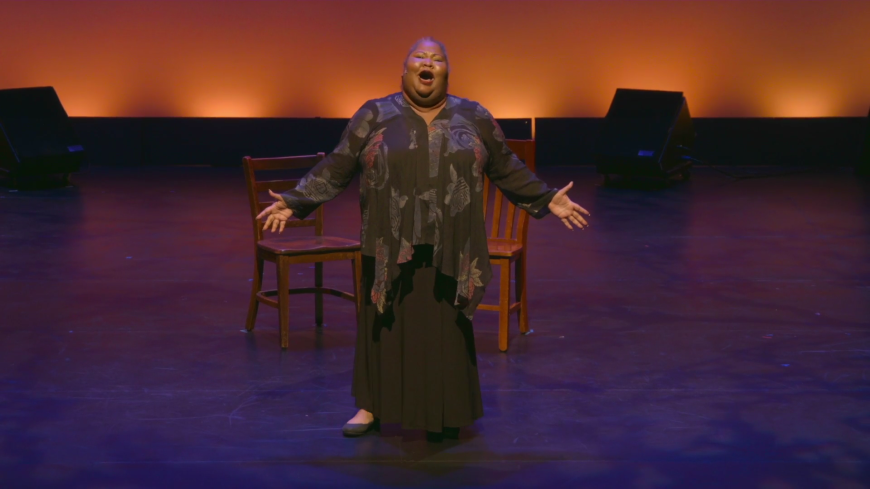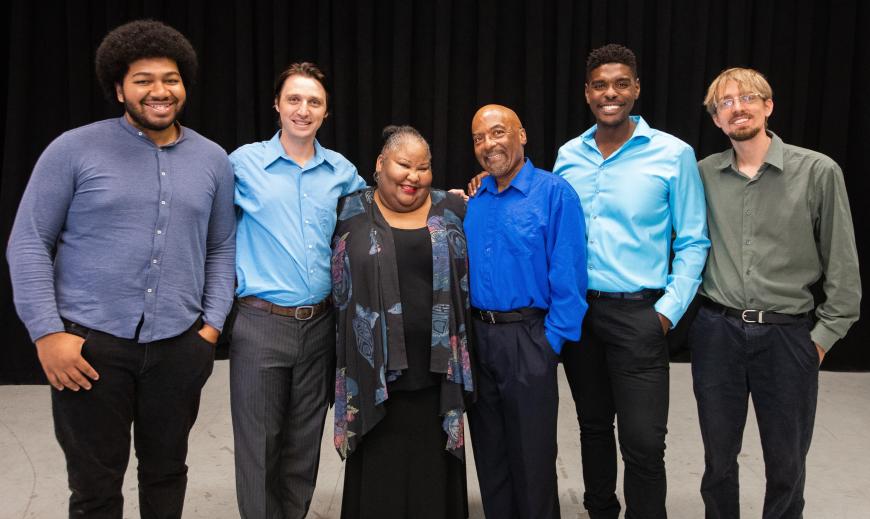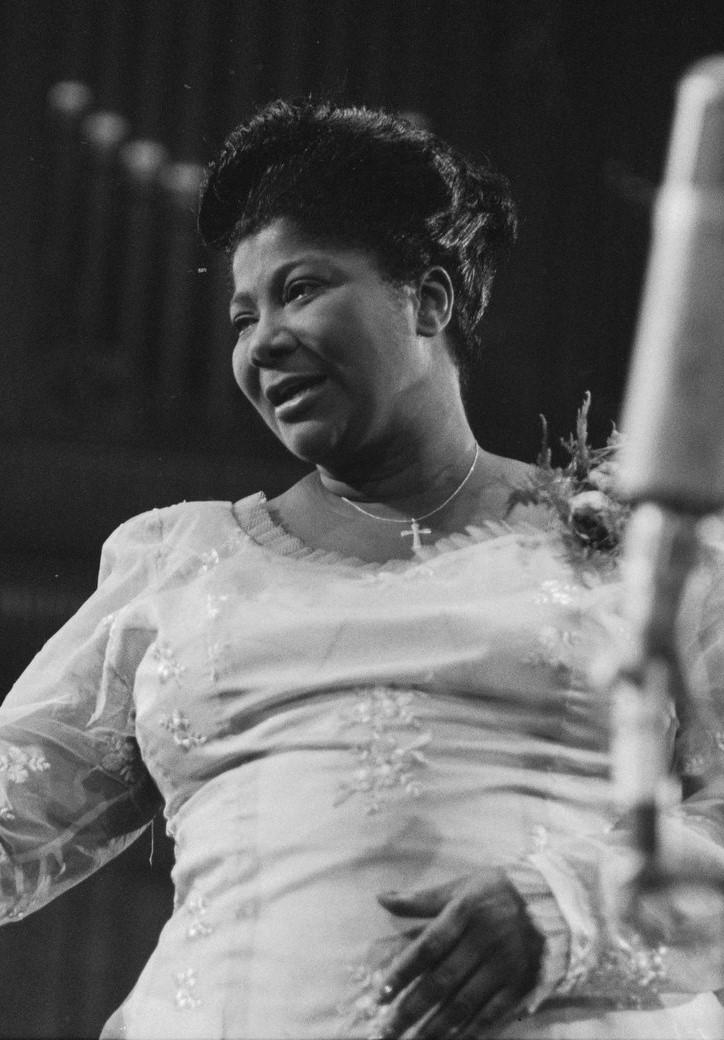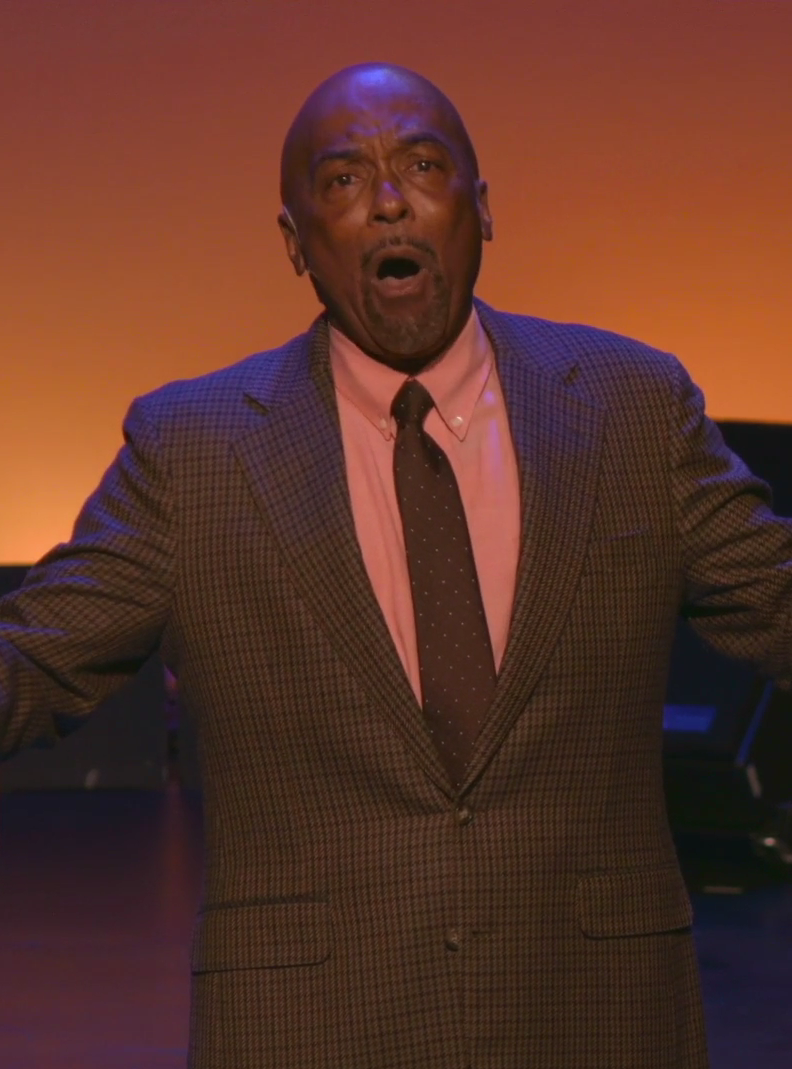
When director/actor/professor Darryl V. Jones rattles off the playlist for HALIE! The Mahalia Jackson Musical, something spectacular happens. String the titles of the songs together, and they form a narrative of the life and times of this remarkable songstress:
“Didn’t It Rain,” “Precious Lord,” “Let the Church Roll On,” “Good News, the Chariots Are Coming,” “Keep Your Hand on the Plow,” “Search Me Lord,” “Heaven Help Me,” “I’m Going to Wait Until My Change Comes.”
Jones says, “The show is a cavalcade of Mahalia Jackson hits, one after another. The music ranges from get-on-your-feet-and-clap to break-your-heart gospel and blues. Someone asked me the other day what I want people to take away from it. In addition to an underscored message to young people that they can do anything they set their minds to do, HALIE! is about joy, and people are going to leave as if on a cloud.”
Which is likely true given the source material: a script drawing a portrait of Jackson’s life, work, and legacy, co-written by Jones with his dear friend and colleague, the late theater artist Wendy E. Taylor, who died in 2019. Now, Jones is directing the world premiere at San Francisco’s venerable Lorraine Hansberry Theatre Dec. 2–24. The creative team includes pianist/composer Andrew Barnes Jamieson (musical direction) and Hannefah Hassan-Evans (choreography), and the rock-solid four-person cast is Jeannine Anderson, Rodney Earl Jackson Jr., Sam Faustine, and Jones himself.

The musical was originally written by Taylor in a text-heavy “informance” style. In addition to appearing as an actor and singer on stage and in films, Taylor majored in African American studies at the University of Maryland and in later years earned a Bachelor of Theology. When the production was first being developed, she served in the music ministry at Christian Cultural Center in Brooklyn, New York. With Jones as a collaborator, she brought the show to workshops at California State University, East Bay in 2015.
“When I again picked up the script, it was during the pandemic,” says Jones. “There was COVID, and there was George Floyd’s murder resonating with racism, civil rights, social injustice. Mahalia had been on the forefront of the civil rights movement in the 1950s and ’60s. She had been raised in New Orleans, in a poor Black and white ghetto. Still, she saw the inequities in race relationships and Black people suffering [disproportionately] in New Orleans. While she always had white people in her life, she also spoke out about social injustices and racism. Unfortunately, we all know today [that] we’ve not moved as far away from what was around her in her life as hoped.”

But HALIE! is far from a diatribe of frustration, likely because it is reflective of Jackson’s character and personality. “She moved with this amazing talent and with incredible belief in herself,” says Jones. “There is great power in that and in holding on to a vision. That became an important element of the story to highlight: for young people — yes, especially young Black men and women — to see that determination and strength. Secondly, we also wanted to humanize her. For example, she was very tightfisted with money because she’d grown up without it, so it was understandable. The play is structured so we see the trials and tribulations, and we also see how she overcame the troubles in her life.”
The structure of the show alternates between August Wilson-style dialogues and theatrical storytelling, with both elements woven together by songs from Jackson’s vast repertoire. The spoken scenes have three backup gospel singers who travel with Jackson throughout her life, breaking the fourth wall to speak directly to the audience. Jones says, “That’s a little fictitious because although she always had backup singers, it wasn’t the same three throughout her life.”
Jones says there are “tons” of stories he loves but that “didn’t make the cut.” One is about Jackson’s early days in Chicago, when she first saw and heard live one of her idols, Bessie Smith. Another story tells of Jackson’s one humiliating voice lesson with a professor of music who criticized her singular pronunciation and “tore her to shreds.” Another describes Jackson’s experiences and reactions to having her voice analyzed by a team of anthropologists at Harvard University. “She figured it was strange, but she was there, so she sang,” says Jones.
While completing the script, Jones says he was in “constant communication” through prayer and thought with Taylor, Jackson, and a host of spirits composed of their and his Black female ancestors. Preserving and honoring Taylor’s innate ability to write in the Black American vernacular, he moved the show from one heavy on facts and information to a sweeping, lively musical history.

Anderson, in the titular role, is a natural actor with a powerful, intense, emotionally expressive voice, Jones says. “The vibrations literally go through you; it’s like you’re hit with a wave of sound that’s brilliant, glorious.” Rodney Earl Jackson Jr., who is separately the artistic director/co-founder of the San Francisco Bay Area Theatre Company, brings gifted acting, singing, and dancing, Jones continues, and Faustine’s command of a range of styles is well-purposed. Jamieson, who has restructured the songs, performs the entire score “from top to bottom without a single page of music in front of him,” according to Jones. “It’s all in his head, which is amazing.”
For audiences, it’s more than probable that Jackson’s songs will resonate, and they’re sure to check out online or brick-and-mortar music purveyors for more. Jones welcomes all of that, but, when asked about Black theater and its position in the arts scene today, he sends a broader message:
“When I started my career, it was to become a theater artist. Just that, not specifically a Black theater artist. Even so, the field was much more segregated, and it was rare [that] I was offered any play that wasn’t written by or about African Americans. I had grown up in white middle-class suburbia and didn’t know much more about Black history than the white people around me. When I became a director, I had to learn about my people. When I became a professor, that became even deeper.
“Black theater today embraces all aspects of the African diaspora and also all aspects of who we are as African Americans. We can be straight, gay, biracial, anything; the narrative can be joyful, science fiction, anything. Theater in the past was about telling our stories and getting it right, but new voices are about combined stories that show the whole realm of Black people as human beings. Getting those stories out that show young people [role] models that say, ‘This has been done, you can do it too,’ that say, ‘These people are you onstage, and you have agency to go out and accomplish things’ — that is the message of Mahalia Jackson and of Black theater.”

